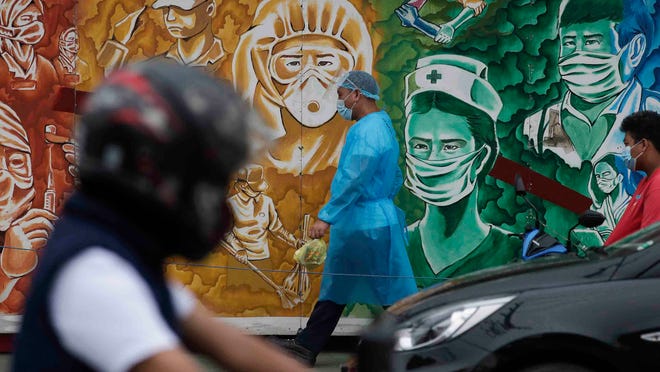
An advisory committee voted unanimously Friday to recommend authorizing a COVID-19 vaccine from Johnson & Johnson for use in adults, paving the way for an expected Food and Drug Administration authorization within the next few days.
Johnson & Johnson agreed to provide 100 million doses of its single-shot vaccine in the U.S. by June, including 20 million by the end of March. Those doses will add to the 300 million doses Pfizer-BioNTech and Moderna each have promised to deliver by the end of July.
The vaccine was shown to be 72% effective in a U.S. trial in which all ethnic, racial and age groups benefited about the same, and was shown to be 85% effective in preventing the most severe disease.
President Joe Biden called Johnson & Johnson's shot, which is expected to be authorized by the FDA as soon as Saturday, a "third, safe, effective vaccine."
Meanwhile, the head of the Centers for Disease Control and Prevention Dr. Rochelle Walensky warned Friday about a "concerning" uptick in new COVID-19 cases in recent days, citing the spread of virus variants.
Biden urged Americans not to let their guards down.
"It's not the time to relax," Biden said. He added: "And for God's sake, wear your mask."
Also in the news:
►The federal government has agreed to buy a 100,000 doses of a COVID-19 treatment by Eli Lilly, the company announced Friday. The drug, bamlanivimab, is a monoclonal antibody, meaning it mimics one of the natural antibodies the immune system uses to fight off the virus. The FDA authorized the drug late last year.
►The federal government has supported 441 community vaccination centers in the U.S., including 171 that have been staffed with federal personnel, said Andy Slavitt, the White House senior adviser for COVID-19 response. Two new federal vaccinations sites were also announced Friday, in Chicago and Greensboro, North Carolina.
►The Food and Drug Administration will allow Pfizer’s COVID-19 vaccine to be shipped and stored at freezers commonly found in pharmacies rather than the ultra-frigid ones initially required after data from the company showed the vaccine remains stable for up to two weeks in standard freezer temperatures. Thursday's decision will make it easier to distribute and administer the vaccine.
►A U.S. congressional committee has asked Canada to reevaluate its ban on cruises, which prohibits ships from sailing in Canadian waters until March 2022. Canada, meanwhile, authorized AstraZeneca’s coronavirus vaccine in people 18 and over Friday.
►Ivory Coast has become the second country in the world to receive a shipment of COVID-19 vaccines from the global COVAX initiative. The first shipment was sent to Ghana on Wednesday.
►A Senate official ruled Thursday that a $15 federal minimum wage provision cannot be added into the COVID-19 relief package. Senate Democrats are using reconciliation to approve the bill, bypassing filibuster rules that require 60 votes, but reconciliation also triggers rules that require provisions of the bill be tied directly to the budget. The House is poised to pass the relief package Friday.
►Two U.S. Navy warships in the Middle East were returning to port in Bahrain as they've been hit COVID-19 outbreaks, officials said Friday. A dozen people on board the USS San Diego, which carries sailors and Marines, tested positive for COVID-19 while "several" were positive on the USS Philippine Sea, said Cmdr. Rebecca Rebarich, a spokeswoman for the 5th Fleet.
? Today's numbers: The U.S. has more than 28.4 million confirmed coronavirus cases and 508,900 deaths, according to Johns Hopkins University data. The global totals: More than 113.2 million cases and 2.5 million deaths. More than 94.3 million vaccine doses have been distributed in the U.S. and about 70.4 million have been administered, according to the CDC.
? What we're reading: Doctors recommend patients schedule their mammogram before receiving a COVID-19 vaccine, or space out the two appointments, after some women have been mistaking swollen lymph nodes for breast lumps.
USA TODAY is tracking COVID-19 news. Keep refreshing this page for the latest updates. Want more? Sign up for our Coronavirus Watch newsletter for updates to your inbox and join our Facebook group.
Allegations of vaccine waste, theft investigated in Tennessee
More investigative findings from the state of Tennessee revealed Friday that COVID-19 vaccine might have been stolen in Shelby County, children are believed to have been inappropriately vaccinated and more doses of COVID-19 were wasted than was previously thought.
The state learned of the child vaccinations and the alleged theft weeks after the incidents occurred, State Health Commissioner Lisa Piercey said in a wide-ranging press conference Friday afternoon in which she detailed to reporters numerous instances of poor vaccine management and called the Shelby County Health Department a "low-accountability organization."
Piercey also described Shelby County Mayor Lee Harris and county health officials as slow to report the problems to authorities and lacking candor in conversations with state officials.
The revelations were the latest in a string of vaccine management issues in Shelby County which have been made public this past week.
– Corinne S. Kennedy and Samuel Hardiman, Memphis Commercial Appeal
Cases in nursing homes drop 89%
New federal data offers a glimmer of hope in what has been the darkest and deadliest corner of the pandemic. The number of COVID-19 cases and deaths at America's nursing homes have dropped significantly since December as millions of vaccine doses have been shot into the arms of residents and staff.
The weekly rate of COVID-19 cases at nursing homes plummeted 89% from early December through the second week of February. By comparison, the nationwide case rate dropped 58% and remains higher than figures reported before late October.
The dramatic drop in cases at nursing homes, where nearly 130,000 residents and staff have died since the virus emerged in the U.S., raises optimism for brighter days ahead at nursing homes and in communities overall as more Americans get vaccinated, experts say.
– Ken Alltucker and Jayme Fraser
CDC director warns about 'concerning' case increase
After a several week decline in COVID-19 cases and hospitalizations, Centers for Disease Control and Prevention Director Dr. Rochelle Walensky warned Friday about a "concerning" uptick in cases over the most recent days.
The most recent seven day average of daily new cases was over 66,000 and higher than the average on Wednesday, Walensky said citing CDC data.
The peak in early January was the highest seen in the pandemic, and though current averages are lower, they're still high, Walensky said. "Things are tenuous. Now is not the time to relax restrictions," she said, pointing to the spread of new variants of the coronavirus.
"We may now be seeing the beginning effects of these variants in the most recent data," she added.
NYC schools chancellor, who lost 11 family members to COVID-19, resigns
Richard Carranza, New York City’s Schools chancellor, said Friday he was stepping down from his role, citing the need for time to grieve his 11 family members and close friends who died from COVID-19.
"I feel that I can take that time now because of the place that we are in and the work that we have done together," he said.
The city's schools have largely been heralded for its reopening during the COVID-19 pandemic, and Carranza said the system reopened safely for children of essential workers, distributed over half a million electronic devices for remote learning, and delivered 80 millions meals to its students.
"We have stabilized the system in a way no one thought possible," he added. "The light, my fellow New Yorkers, is truly at the end of the tunnel."
Carranza will be succeeded by Bronx Executive Superintendent Meisha Ross Porter, who will become the first Black woman to lead the nation's largest school district.
Mass shootings hit record high in pandemic year. Can vaccines bring peace in 2021?
Mass shootings jumped nearly 50% in 2020, due in large part to a pandemic year rife with crippling unemployment, violent protests and idle youth. With COVID-19 cases falling and vaccines rolling out, some criminologists hope a rebounding economy and reopened schools will drive down those numbers in 2021.
Early results are promising, says Mark Bryant, founder of the nonprofit Gun Violence Archive, which tracks gun incident trends. In the first seven weeks of this year, there have been 63 mass shootings — defined as four or more people injured or killed in one incident — which if continued would show a drop from 2020, he said.
“I’m hoping last year proves to be the anomaly,” Bryant said. “The stresses caused by last year, from jobs to illness, were not just an urban thing or a rural thing. We saw bumps in towns in Louisiana and Mississippi, as well as in Chicago and Philadelphia.”
– Marco della Cava and Mike Stucka
Queen Elizabeth urges vaccines as UK to prioritize people 40 and over next
People ages 40 and over will be next in line for the vaccine in the U.K., the country's public health officials said. The BBC reported that the Joint Committee on Vaccination and Immunisation opted for an age-based rollout to prevent a slowdown from a "more complex" occupation-based one.
Meanwhile, Queen Elizabeth urged the public to get vaccinated, saying the process was quick and painless. “Well, once you’ve had the vaccine you have a feeling of, you know, you’re protected, which is, I think, very important,” the Queen said Friday.
The 94-year-old monarch said she understood some might be hesitant but that "they ought to think about other people rather than themselves."
'We have to fight this together as one,' Joe Biden tells state governors
When Washington state Gov. Jay Inslee butted heads with Donald Trump last year over the prior administration’s handling of the coronavirus pandemic, the then-president called Inslee a snake.
“I may still be one,” the governor said on Thursday with a chuckle when asked how things have changed under President Joe Biden. “But I’m a well-cared-for snake.”
During the National Governors Association's winter meeting, held virtually Thursday, Biden called states the "laboratories of democracy" in a nod to their independence. But he emphasized that a national approach is needed on the pandemic and other issues because "so many of our challenges don’t stop at our border of our states."
"We have to fight this together as one," Biden told the governors.
– Maureen Groppe and Courtney Subramanian
Contributing: Karen Weintraub, USA TODAY; The Associated Press
Source link







